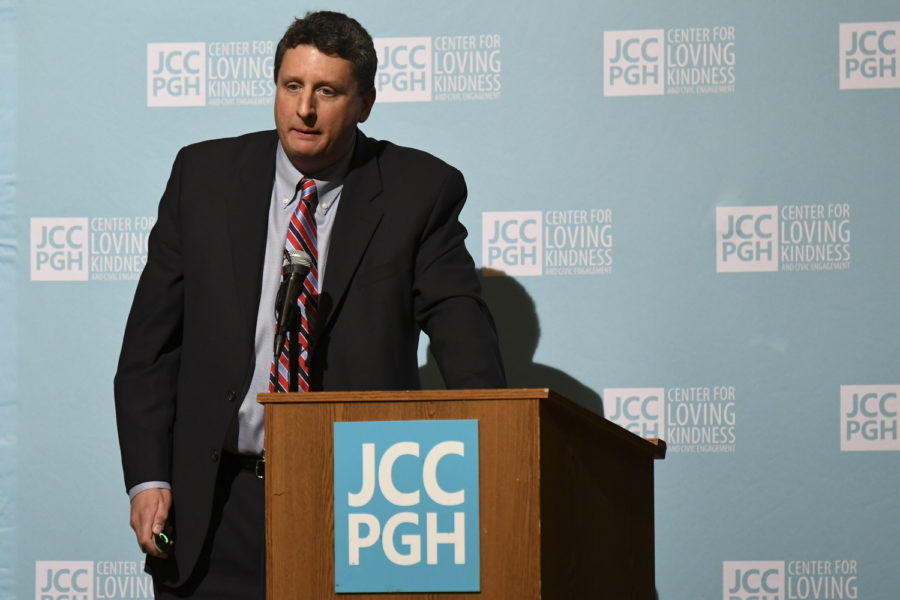Activists, elected officials discuss Beaver County cracker plant
Bader Abdulmajeed | Staff Photographer
Mathew Mehalik, PhD, executive director of the Breathe Project, speaks at the Protecting Our Communities environmental panel about air quality and plastic pollution in Pittsburghat the Jewish Community Center Thursday night.
December 7, 2018
Pittsburgh residents, environmental activists and elected officials gathered at the Jewish Community Center of Greater Pittsburgh Thursday to light a virtual menorah for the fifth night of Hanukkah. But they also started an important conversation, airing their concerns about pollution and climate change.
The JCC of Pittsburgh hosted “Protecting our communities: Environmental challenges from fossil fuel extraction in SWPA” Thursday evening. The purpose of the event was to provide a forum for community members and elected officials to talk about the future construction of an ethylene cracker plant in Beaver County, about 30 miles northwest of Pittsburgh.
The purpose of the JCC of Pittsburgh’s event reflects Jewish values, Rabbi Ron Symons, senior director of Jewish Life at the JCC, said.
“Through the Center for Loving Kindness and Civic Engagement, we believe that we should be redefining neighbor from a geographic term to a moral concept, to make the argument that there’s nothing more important than actually the air that we breathe,” Symons said. “So that’s taking more responsibility for our neighbors.”
Beaver County’s newest neighbor, Shell’s new cracker plant is a $6 billion manufacturing facility which would produce plastics from underground oil deposits extracted through hydraulic fracturing, or fracking. Shell also plans to build a pipeline that would stretch approximately 97 miles through Ohio, West Virginia and western Pennsylvania.
But environmental groups, as well as residents, are concerned about the environmental impacts of constructing such a facility. Matthew Mehalik, the executive director of Breathe Project, an organization that provides air quality information about Pittsburgh, said the projected health and environmental impacts outweigh the benefits of building the Shell cracker plant.
“There will be significant negative healthcare impacts from the development of this industry,” Mehalik said. “It’s going to cost us in Allegheny County, somewhere between $15 and $33 million per year in additional health care costs.”
Mehalik also said the plant would have enormous environmental impacts, projecting that it would emit over 3 million metric tons of carbon dioxide per year. The most recent Pittsburgh Climate Action Plan puts annual carbon dioxide emissions from the City of Pittsburgh at 5 million metric tons per year, meaning the Shell plant would emit half of the total emissions of Pittsburgh.
Activists and elected officials discussed the ways that community members can fight back against climate change and air pollution that comes from industrial sources. Among those who spoke was Summer Lee, State House representative-elect for District 34, which includes much of the old industrial towns in the Mon Valley. Lee said her experience growing up in Braddock shaped her political views.
“We always lived in the shadow of the Edgar Thomson Steel Mill, and when we were kids, we made jokes about the smell of Edgar Thomson,” Lee said. “But the thing that we didn’t joke about was that because of my race and my socioeconomic status, I was more likely than anybody else to suffer from environmental degradation.”
Lee said the way to address these issues is to get members of these communities involved in politics. She ran a campaign on environmental justice issues, focusing on how her community and others like it can get representation in legislative branches.
“When you look around a room like this, the people who are like me, who grew up where I grew up, aren’t in these rooms,” Lee said. “But we have stories and we have experiences, and if you were to ask or include them, they can tell you exactly why a fracking well at Edgar Thomson is a death sentence for them.”
While many elected officials said they would make changes at the level of government they were involved in, they also said concerned residents can make as large of an impact. State Rep. Dan Frankel, who represents Oakland and Squirrel Hill, said students can play an important role in fighting climate change, particularly during elections.
“When I take a look at what happened in this 2018 election back at the state and federal level, I think that young voters, generally students, turned out in record numbers and made a significant difference in many of these elections,” Frankel said. “Environmental issues and climate change are at the very top of that [priority] list for, say, the under-40 group.”
Though the speakers were well-received by the audience, some audience members wanted the chance to speak directly to their elected officials. Emerson O’Donnell, a 25-year-old resident of North Side, is a member of the Pittsburgh chapter of the Democratic Socialists for America. While they supported the mission of the event, they said they would have preferred more audience engagement with those who spoke.
“It’s good to educate people and to get folks involved in the work,” O’Donnell said. “I was hoping for more of an active Q&A with the folks who were speaking. I think maybe fewer speakers and more audience participation would have been a good thing.”
But many others were optimistic about the work they could do to fight climate change and air pollution in the future. Joanne Martin, a resident of Beaver County, said the Pittsburgh community has leaders that will effect meaningful change.
“We need long-haul heroes,” Martin said. “People who are devoted to a whole-earth community and are not captives of a political or economic agenda at the expense of people or planet.”








